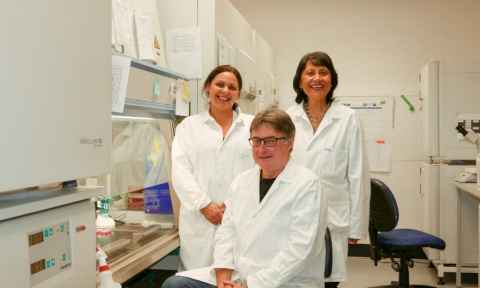Why are Pacific patients not getting much-needed bariatric surgery?
31 October 2019
Pacific peoples in New Zealand have the highest drop-out rate for weight loss surgery despite being the most affected by obesity-related health conditions.

University of Auckland Pacific emerging researcher Dr Tamasin Taylor, of Samoan heritage, has received the Health Research Council (HRC) Sir Thomas Davis Health Research Fellowship to test if a Pacific-led, pre-surgery support initiative could turn this around, improving Pacific patient retention rates and treatment outcomes starting with the bariatric surgery programme at Auckland City Hospital.
This new fellowship follows on from Dr Taylor’s current HRC-funded Pacific postdoctoral research, due to be completed shortly, which has identified the systemic, social and economic barriers New Zealand’s Pacific patients face when they are referred to publicly funded bariatric surgery programmes.
“My current study explored the reasons behind why the pre-surgery stage of bariatric surgery [around three to six months before surgery] is the key point at which Pacific patients are significantly vulnerable to disengaging with public health services and dropping out,” she said.
Between 2007 and 2016, about 73 percent of Pacific patients enrolled in Auckland City Hospital’s bariatric surgery programme dropped out before undergoing their surgery, and 87 percent of Pacific males. This was in comparison to a drop-out rate of 39 percent for New Zealand Europeans and 50 percent for Māori, says Dr Taylor.
Clinical environments and an underrepresentation of Pacific staff are particular barriers to developing emotional safety, trust and acceptance of the surgery process with patients and their families.
A nationwide study found that between 2009 and 2014 only 0.7 of out of 1000 Pacific peoples with morbid obesity received bariatric surgery in comparison to three out of 1000 New Zealand Europeans. This translates to 7 in 10,000 affected Pacific peoples compared to 30 in 10,000 affected New Zealand Europeans.
Dr Taylor says this is the case even though Pacific populations in New Zealand have the highest rates of obesity-related conditions such as type 2 diabetes, sleep apnoea, hypertension and kidney disease – conditions which can all be significantly improved or resolved through bariatric surgery treatment. For example, bariatric surgery has been shown to resolve type 2 diabetes in around 80 per cent of patients following surgery.
Currently in New Zealand, the surgery preparation requirements for publicly funded bariatric surgery programmes varies between district health boards. However, they generally include the need to attend pre-surgery appointments and group support meetings, make demonstrable changes to diet and physical activity, and, in some cases, lose a set percentage of excess weight.
Dr Taylor says one of the problems with these requirements is that they are treated as equally attainable for all patients.

"The reality is that Pacific patients are more likely to be disadvantaged as many face greater structural barriers within hospital programmes and significant social and economic barriers. Clinical environments and an underrepresentation of Pacific staff are particular barriers to developing emotional safety, trust and acceptance of the surgery process with patients and their families."
Stigma surrounding surgery, social pressures from family and friends, and a lack of positive role models also act as barriers to going through with surgery, says Dr Taylor, who is currently preparing a paper for publication about these findings based on interviews with health professionals and patients.
“While bariatric surgery isn’t the population-level answer to obesity, it is crucial that patients who are referred for surgery and accept a place on the bariatric surgery programmes are adequately supported to get through the pre-surgery stage,” says Dr Taylor.
As part of her two-year Sir Thomas Davis Health Research Fellowship, Dr Taylor will develop a Pacific-led preoperative support group for Pacific patients enrolled in the bariatric surgery programme at Auckland City Hospital, with input from the surgery team led by specialist bariatric surgeon Mr Grant Beban. The group will also have substantial participation from former successful Pacific bariatric surgery patients.
HRC manager of Pacific research investment, Tolotea Lanumata, says if successful, this research has the potential to impact on Pacific patients’ uptake of bariatric surgery. It could also be applied to other areas of health where Pacific patients are experiencing barriers to engaging with health services.
"Reducing the health inequities facing our Māori and Pacific populations is a major focus of the Government’s New Zealand Health Research Strategy and Tamasin’s research ties in perfectly with this objective. Removing or reducing the barriers facing Pacific bariatric surgery patients will hopefully empower them to succeed with their weight loss and enable both them and our health system to reap the benefits," says Ms Lanumata.
Dr Taylor’s study is one of 25 HRC Pacific Career Development Awards announced in October for a combined total of $2.9 million – an almost $1 million increase on last year, reflecting the growing talent base of up-and-coming Pacific health researchers and the HRC’s commitment to support them. Lay summaries for all recipients' projects are available on the HRC website (filter for ‘Pacific Health Research’ and ‘2020’).
Media contact
Nicola Shepheard | Media adviser
DDI: 09 923 1515
Mob: 027 537 1319
Email: n.shepheard@auckland.ac.nz